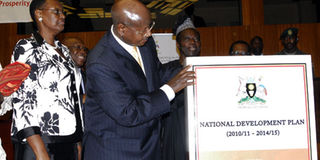Government launches development plan

President Museveni, flanked by the First Lady, unveils the National Development Plan yesterday in Kampala. The Shs54 trillion five-year design seeks to transform Uganda from a predominantly peasant society to a middle income country. PHOTO BY GEOFFREY SSERUYANGE
Kampala
President Museveni yesterday unveiled a Shs54 trillion National Development Plan (NDP) that the government believes will transform Uganda from a predominantly peasant society to a middle income country by 2015.
The 441-page plan which replaces the Poverty Eradication Action Plan (PEAP) will guide the country’s development programmes over the next five years. Its successful implementation will ensure that on average, every Ugandan earns at least Shs1.8 million ($900), up from the current Shs1 million ($506), per year.
Infrastructure key
Through the plan, the government will focus on investing in infrastructure development mainly -energy, railway, waterway and air transport; human resource development in areas of education skills, health, water and sanitation.
During the period, the proportion of people living below the poverty line is expected to decline from 31 per cent in 2005/6 to about 25 per cent by 2015, slightly below the Millennium Development Goals (MDG) target of 28 per cent.
The NDP further addresses structural bottlenecks in the economy in order to accelerate socio-economic transformation for prosperity. Solutions in the NDP aim at creating employment, raising average per capita income levels, improving the labour force distribution and improving Uganda’s competitiveness to levels associated with middle class income countries.
Private sector role
The plan is to be achieved through a quasi-market environment where the private sector will remain the engine of growth and development. In his address at the launch, President Museveni emphasised the need for the private sector to lead the implementation of the plan.
“One of the mistakes of African economies is the limited markets they have. What we are saying is that let the private sector lead the growth and government should provide the atmosphere for them to do this,” said President Museveni.
Part of the lack of proper planning, Mr Museveni said has been failure to apply the correct vision in planning for programmes that can transform the economy and bring social change. “Some of the early plans failed because of poor vision. For example if you stifle the private sector even if have good plans, it will not work because you are missing a crucial player,” Mr Museveni explained. He urged Uganda’s development partners to fit into the new plan and not come with new ideas for the county to follow.
Experts react
Mr Thomas Richardson, the IMF senior resident representative in Uganda, said the plan touches the right strategic priorities emphasising infrastructure investment and solving bottlenecks to growth.
Mr Japeth Katto, the chief executive officer of the Capital Markets Authority, welcomed the new plan saying it will promote coordinated planning in government. “The challenge is each one of us should pick up what is relevant to our sectors and move forward so that we are all plan in a coordinated way,” he said.
Prof. Adedeji Adebayo, the former executive secretary of the United Nations Economic Commission for Africa, who gave a keynote speech at the launch, said for it to work successfully, its beneficiaries must be greatly involved.




